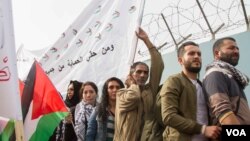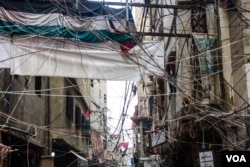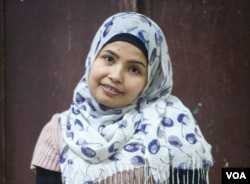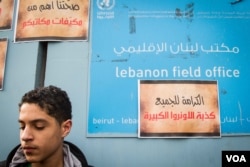As he tries to scrape funds together to treat his daughter’s life-threatening condition, Fouad Abu Khaled is fearful, not just for the future of his family, but for the entire Palestinian diaspora.
Recent changes in medical support offered by UNRWA — the U.N. body created to support Palestinian refugees — have left him, and many other Palestinians living in Lebanon, angry and uncertain.
“I’m sure they will stop the funding,” Abu Khaled told VOA, referring to the financial aid given by UNRWA to help 26-year-old Wafaa, who suffers from a hereditary blood condition called Thalassemia.
“It hasn’t happened yet as we’ve not gone to the hospital, but they will,” he said, his voice rising. “And then, soon, all UNRWA services will stop.”
There are many Palestinians in Lebanon who share Abu Khaled’s fears.
Shifts, not cuts
At the start of this month, UNRWA shifted the way it offers medical support for Palestinians in the country.
The response was swift; and desperate.
In the latest of many such protests, UNRWA’s Beirut headquarters were besieged Friday by demonstrators who believe that medical aid is set to be reduced, or wiped out entirely.
Recently, Mohammad Omar Khodeir, who also suffers from Thalassemia, set himself on fire in response to the changes.
UNRWA contends the changes are just that — shifts in where the cash in being spent, rather than an overall cut in the top-line budget.
“We did not do this to save money,” claimed Zizette Darkazally, a spokeswoman for UNRWA in Lebanon who was equally emphatic to dismiss any fears about the imminent demise of UNRWA.
She told VOA the medical aid budget for 2016 in Lebanon remained unchanged from last year at $10 million.
But now funding has been shifted to offer greater support for specialist care and for those suffering long-term conditions, like cancer. Funding for medicines remains unchanged.
Tensions easily stoked
Many will still be hurt by the shift in funds.
Palestinians who previously enjoyed free care must now pay 20 percent of costs for visits to private hospitals, 15 percent for care at government hospitals and five percent for care at hospitals run by the Palestinian Red Crescent Society.
In a country where, according to UNRWA’s own figures, more than half the registered Palestinians live below the poverty line and 80 percent are unemployed, reliance on aid is high.
“Palestinians in Lebanon, in particular, cannot access the labor market, or a welfare state, or a range of other services,” said Rex Brynan, professor of political sciences at the McGill University, and author of several books about Palestinian refugees.
“That’s why, in Lebanon, when the UNRWA sneezes, Palestinians catch a cold,” he said.
In this context, when it comes to aid, tensions are easily stoked.
Darkazally argued the changes had been “misrepresented” and politicized, with rumors replacing facts as Palestinian political factions sought to drum up popularity.
Abu Khaled, for one, is convinced that he will have to pay the full $200 a month to help treat his daughter’s condition, rather than the $100 he used to pay.
The reality, however, is that the cost of his daughter’s treatment is likely to remain funded.
The idea that some will benefit from the changes has not filtered through, Darkazally added.
“People are in despair and hanging on to every word.”
Growing costs
A critical lack of funding for other provisions has exacerbated this despair, fueling the rumors currently swirling through the Palestinian community.
Though donations to UNRWA marginally increased last year, they have not kept up with growing costs.
Last year, the $100 a month cash assistance for housing the estimated 42,000 Palestinian refugees who escaped Syria for Lebanon - a system that helped Abu Khaled and his family who fled in 2012 - was cut.
Shortly before the start of the school term last summer, the future of UNRWA’s extensive network of schools across the region also came under question amid a $110 million cash shortfall.
The crisis was averted and the cash raised, but many Palestinians do not see it that way.
Twenty-one-year-old Islam Durani heard about the change in medical funding from her friends and neighbors, though she’s unsure exactly what’s being cut.
“I’m sure they have the funds,” she said, “and I’m sure they just want to put pressure on Palestinians. I can’t think of another reason,” she told VOA.
A voice for the Palestinians
Yet for all the cynicism, once the protesters take their placards home, it is upon UNRWA that many will remain dependent — a dependency that stretches well beyond the provision of day-to-day basics.
“Palestinians see UNRWA as an international representative of their rights and they’re constantly worried about those rights being eroded,” said Brynan.
“That’s why anything that is a deviation from the status quo is seen as an attempt to liquidate the refugee issue.”
Meanwhile, Abu Khaled has vowed to keep attending the protests, and not just for the sake of his daughter.
“I’m fighting for my bread, for my family,” he said. “But the bigger goal is to show people that we are human beings. No one will listen to us unless we show that we will fight for this right.”







